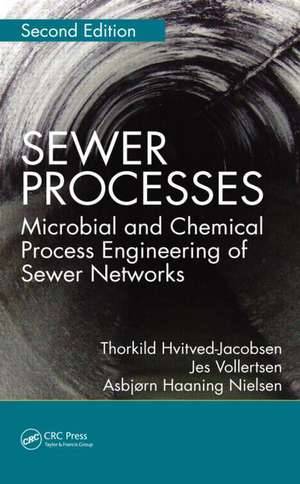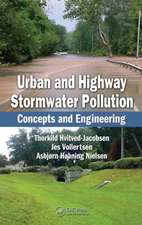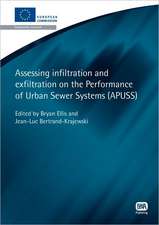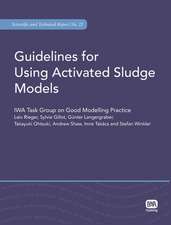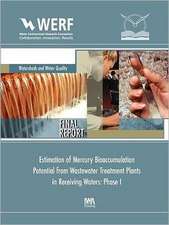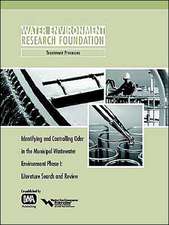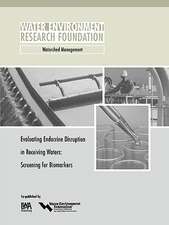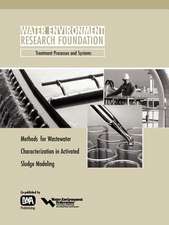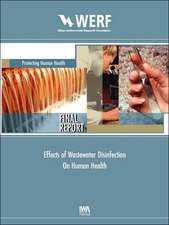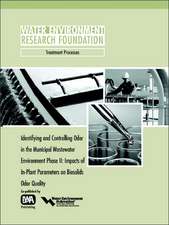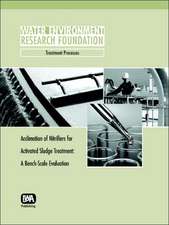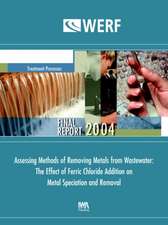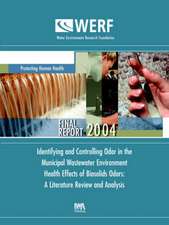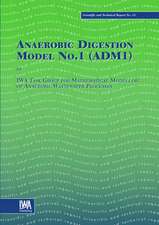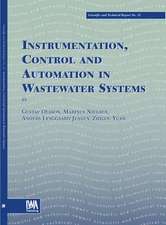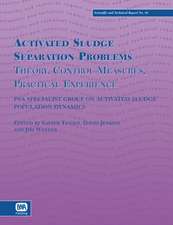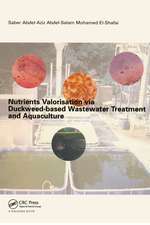Sewer Processes: Microbial and Chemical Process Engineering of Sewer Networks, Second Edition
Autor Thorkild Hvitved-Jacobsen, Jes Vollertsen, Asbjørn Haaning Nielsenen Limba Engleză Hardback – 23 apr 2013
Reflecting the most current developments, Sewer Processes: Microbial and Chemical Process Engineering of Sewer Networks, Second Edition, offers the reader updated and valuable information on the sewer as a chemical and biological reactor. It focuses on how to predict critical impacts and control adverse effects. It also provides an integrated description of sewer processes in modeling terms. This second edition is full of illustrative examples and figures, includes revisions of chapters from the previous edition, adds three new chapters, and presents extensive study questions.
- Presents new modeling tools for the design and operation of sewer networks
- Establishes sewer processes as a key element in preserving water quality
- Includes greatly expanded coverage of odor formation and prediction
- Details the WATS sewer process model
- Highlights the importance of aerobic, anoxic, and anaerobic processes
Preț: 1008.97 lei
Preț vechi: 1230.44 lei
-18% Nou
Puncte Express: 1513
Preț estimativ în valută:
193.06€ • 201.59$ • 159.43£
193.06€ • 201.59$ • 159.43£
Carte tipărită la comandă
Livrare economică 15-29 aprilie
Preluare comenzi: 021 569.72.76
Specificații
ISBN-13: 9781439881774
ISBN-10: 1439881774
Pagini: 400
Ilustrații: 108 b/w images, 56 tables and 243
Dimensiuni: 156 x 234 x 26 mm
Greutate: 0.7 kg
Ediția:Revizuită
Editura: CRC Press
Colecția CRC Press
ISBN-10: 1439881774
Pagini: 400
Ilustrații: 108 b/w images, 56 tables and 243
Dimensiuni: 156 x 234 x 26 mm
Greutate: 0.7 kg
Ediția:Revizuită
Editura: CRC Press
Colecția CRC Press
Public țintă
Academic, Professional, and Professional Practice & DevelopmentCuprins
Sewer Systems and Processes. In-Sewer Chemical and Physicochemical Processes. Sewer Atmosphere: Odor and Air–Water Equilibrium and Dynamics. Aerobic and Anoxic Sewer Processes: Transformations of Organic Carbon, Sulfur, and Nitrogen. Anaerobic Sewer Processes: Hydrogen Sulfide and Organic Matter Transformations. Sewer Processes and Mitigation: Water and Gas Phase Control Methods. Sewer Process Modeling: Concepts and Quality Assessment. WATS: A Sewer Process Model for Water, Biofilm, and Gas Phase Transformations. Methods for Sewer Process Studies and Model Calibration. Applications: Sewer Process Design and Perspectives. Appendix A: Units and Nomenclature. Appendix B: Definitions and Glossary. Appendix C: Acronyms. Index
Notă biografică
Thorkild Hvitved-Jacobsen, MSc, is professor emeritus at Aalborg University, Denmark. In 2008, he retired from his position as professor of environmental engineering at the Section of Environmental Engineering, Aalborg University, Denmark. His primary research and professional activities concern environmental process engineering of the wastewater collection and treatment systems, including process engineering and pollution related to urban drainage and road runoff. His research has resulted in more than 320 scientific publications in primarily international journals and proceedings. He has authored and coauthored a number of books published in the United Kingdom, the United States, and Japan.
Jes Vollertsen, PhD, is a professor of environmental engineering at the Section of Water and Soil, Department of Civil Engineering, Aalborg University, Denmark. His research interests are urban storm water and wastewater technology, where he combines experimental work on bench scale with pilot-scale studies and field studies. He integrates the gained knowledge on conveyance systems and systems for wastewater and storm water management by numerical modeling of the processes. He is an experienced consultant for private firms and municipalities as well as on litigation support. He is a reviewer for a national research committee in relation to environmental engineering.
Asbjørn Haaning Nielsen, PhD, is an associate professor of environmental engineering at the Section of Water and Soil, Department of Civil Engineering, Aalborg University, Denmark. His research and teaching has primarily been devoted to wastewater process engineering of sewer systems and process engineering of combined sewer overflows and storm water runoff from urban areas and highways. He has extensive experience with chemical analyses of complex environmental samples, particularly relating to the composition of wastewater and sewer gas. He is a committee member of the Danish National Committee for the IWA.
Jes Vollertsen, PhD, is a professor of environmental engineering at the Section of Water and Soil, Department of Civil Engineering, Aalborg University, Denmark. His research interests are urban storm water and wastewater technology, where he combines experimental work on bench scale with pilot-scale studies and field studies. He integrates the gained knowledge on conveyance systems and systems for wastewater and storm water management by numerical modeling of the processes. He is an experienced consultant for private firms and municipalities as well as on litigation support. He is a reviewer for a national research committee in relation to environmental engineering.
Asbjørn Haaning Nielsen, PhD, is an associate professor of environmental engineering at the Section of Water and Soil, Department of Civil Engineering, Aalborg University, Denmark. His research and teaching has primarily been devoted to wastewater process engineering of sewer systems and process engineering of combined sewer overflows and storm water runoff from urban areas and highways. He has extensive experience with chemical analyses of complex environmental samples, particularly relating to the composition of wastewater and sewer gas. He is a committee member of the Danish National Committee for the IWA.
Recenzii
"… a fine technical guide suitable for any environmental engineering collection and provides a comprehensive, updated approach to wastewater engineering that incorporates the latest developments. … a top pick for any student of environmental engineering and many working in the field."
—Midwest Book Review, September 2013
"… an up-to-date description of the biophysicochemical factors and processes driving the sulfur cycle in sewer networks. … allows the reader to better understand which parameters matter in these particular conditions. … the authors particularly underline the difficulty of predicting concrete corrosion due to complexity of corrosion mechanisms."
—Eric D. van Hullebusch, Université Paris-Est Marne-la-Vallée, France
"The second edition of this book is very welcomed. The Process Engineering approach taken in this book means that it bridges several engineering disciplines and is accessible to students, academics and practioners alike."
—Professor Catherine Biggs, The University of Sheffield
"… a very comprehensive and updated approach, allowing post graduate students of environmental engineering and related fields to have a solid and orientated formation on relevant aspects of wastewater engineering … . The book includes solved illustrative examples and case studies, which reinforce this publication as an excellent engineering guide for helping planners, consultants, and utilities to avoid and/or control risks of significant problems caused by sulfides in sewer systems.
This guide book expands the general understanding of sewer performance with a bioreactor approach to explain and demonstrate, in a rigorous but relatively simple way, how environmentally relevant process engineering can be applied when dealing with design, operation, and maintenance of sewer systems… ."
—José Saldanha Matos, Technical Superior Institute of the Technical University of Lisbon, Portugal
Praise for the Previous Edition
"This book can be used as a resource for environmental engineering courses; it will also be very useful to those who design, manage, and service sewer systems. The book differs from other books on sewer systems in that it includes a process dimension by considering the sewer as a chemical and biological reactor."
—L.E. Erickson, Kansas State University, in CHOICE, June 2002
—Midwest Book Review, September 2013
"… an up-to-date description of the biophysicochemical factors and processes driving the sulfur cycle in sewer networks. … allows the reader to better understand which parameters matter in these particular conditions. … the authors particularly underline the difficulty of predicting concrete corrosion due to complexity of corrosion mechanisms."
—Eric D. van Hullebusch, Université Paris-Est Marne-la-Vallée, France
"The second edition of this book is very welcomed. The Process Engineering approach taken in this book means that it bridges several engineering disciplines and is accessible to students, academics and practioners alike."
—Professor Catherine Biggs, The University of Sheffield
"… a very comprehensive and updated approach, allowing post graduate students of environmental engineering and related fields to have a solid and orientated formation on relevant aspects of wastewater engineering … . The book includes solved illustrative examples and case studies, which reinforce this publication as an excellent engineering guide for helping planners, consultants, and utilities to avoid and/or control risks of significant problems caused by sulfides in sewer systems.
This guide book expands the general understanding of sewer performance with a bioreactor approach to explain and demonstrate, in a rigorous but relatively simple way, how environmentally relevant process engineering can be applied when dealing with design, operation, and maintenance of sewer systems… ."
—José Saldanha Matos, Technical Superior Institute of the Technical University of Lisbon, Portugal
Praise for the Previous Edition
"This book can be used as a resource for environmental engineering courses; it will also be very useful to those who design, manage, and service sewer systems. The book differs from other books on sewer systems in that it includes a process dimension by considering the sewer as a chemical and biological reactor."
—L.E. Erickson, Kansas State University, in CHOICE, June 2002
Descriere
This extensively revised and updated second edition presents major revisions of several chapters, reflecting the theoretical and practical knowledge that has been gained since the publication of the previous edition a decade ago. In addition, it supplies new chapters on advanced modeling of sewer processes and gas phase control. It also includes greatly expanded coverage of odor formation and prediction, as well as of concrete corrosion caused by hydrogen sulfide. The book is written for graduate students, researchers, and industry professionals.
